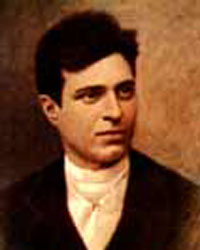Here Mascagni composed at a single stroke, in only two months, the one-act opera Cavalleria rusticana, based on the short story by Verga, which was to win him the first prize in the Second Sonzogno Competition for new operas. The innovative strength of the opera and the resounding worldwide success which followed its first performance (1890, Teatro Costanzi, Rome) marked the beginning of an artistic life rich in achievements and satisfactions, both as composer and as conductor. Among his later compositions the Sonzogno catalogue still lists L’Amico Fritz, Guglielmo Ratcliff, Isabeau, Lodoletta, Le Maschere, Il Piccolo Marat, Silvano and Zanetto. As a highly talented conductor with a much wider repertoire than is commonly believed, Mascagni was among the first to restore popularity in the Twentieth Century to operas by Mozart (Don Giovanni) and Rossini (Mosé, Semiramide), and to make known in Italy the music of Tchaikovsky and Dvorák. Admired by such musicians as Verdi and Mahler and an authentic “star” of his time, of which he was recognised as one of the major protagonists, Mascagni died at the age of 82 in a room of the Hotel Plaza in Rome, where he had spent the last years of his life. |
|
|
|
|
Pietro Mascagni - Composer Information
Search our Library
Featured Composers
Counterpoint Music Library Services
Copyright © 2012 All Rights Reserved
Copyright © 2012 All Rights Reserved
Created by Wavelength Media

